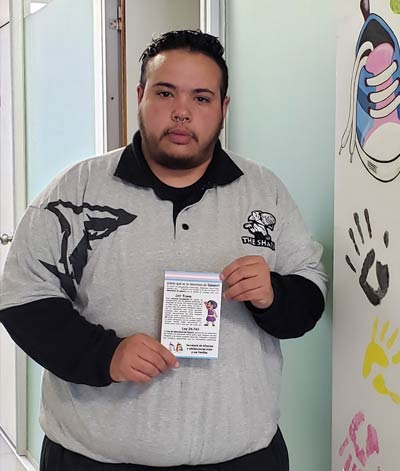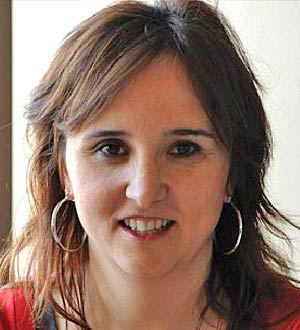


Written by: Valeria Román / Argentina
“I asked my cousin for underwear while my mother insisted that I wore a leotard with a tutu.” His mother wanted a daughter who followed into her footsteps and became a dancer. His mother adopted and named him Gisel and raised him by herself, in an artistic atmosphere in Buenos Aires. But Iván Puhlmann, who was born in 1979, did not feel comfortable wearing wearing buckles or skirts.
“I was a rebel and when I was 9 years old, my mother hospitalized me in a psychiatric hospital for children. I spent a year there and when I left, I started to hide [the fact that I] felt like a male because there were consequences. I left home and I couldn’t stay in school because the bullying was unstoppable and violent. In contrast, I felt good on the outside world because I found the freedom to be who I was,” he remembers.
He felt like a male in a teenage body that made him feel uncomfortable. At 14, he chose the name Iván. When he saw a gynecologist for the first time, accompanied by his mother, he was called by the name assigned to him when he was born and could not understand what was happening. For 22 years, he never went back to a hospital or clinic. “Until 2001, I didn’t know there were trans men. I searched the internet for ‘backwards transvestite’ because that was how I felt. I found information on the internet.”
With the idea to masculinize his body, Puhlmann injected himself with anabolics used by bodybuilders and testosterones, which damaged his liver and kidneys. He only saw a doctor three years ago. His life had changed.

They called him “Iván,” just as he was registered on his ID. He could complete an official name change thanks to the first law of its kind, which established that every person can decide, develop, and express their gender identity according to their own perception and not be forced to undergo medical diagnoses, without having to go through a legal process, and without undergoing a sex reassignment surgery.
Since that law was approved in 2012, there were some improvements in regards to trans women and trans men’s right to healthcare in Argentina. “Different situations, such as being excluded by their families, dropping out of school as a result of harassment, violence exercised by the police, the risk of sexually transmitted diseases, and the discrimination they suffer when they go to hospitals, have negatively impacted the life expectancy of trans people,” says Inés Aristegui, a sociologist and researcher from Fundación Huésped (Host Foundation), who has published several works about the problems the trans community faces. “From the hospital entrance, trans people were mistreated. That stigmatization was internalized and pushed them to never return for medical attention.”
One year after the law was approved, Aristegui’s research team interviewed 498 trans people; 452 trans women and 46 trans men. They found that for every 10 trans people, seven received medical attention through the public health system. Before the law, eight in every 10 trans people felt discriminated. After the law was approved, only 3 in every 10 feel discriminated. After the law, incidents where trans people are not called by their chosen names decreased, as well as bullying and the aggressions perpetrated by healthcare personnel, as well as the refusals to provide them with medical attention. The cases where trans people were hospitalized according to the sex that was assigned to them at birth instead of hospitalizing them based on their self-perceived gender decreased: It went from 34% to 4% in the case of trans women and from 19% to 4.4% in the case of trans men after the law was passed.
“When we are treated at the hospital, we are in such an advanced deterioration state that not much can be done. That is changing little by little. Our activism helped Trans-Vivir (Trans-Living) spaces to exist inside five hospitals in Buenos Aires, where trans people receive support so that their right to health is respected,” says Nadir Cardozo, a 47-year-old trans woman who is a health promoter at hospitals and who coordinates groups at Casa Trans (Trans House). If health promoters learn that a trans person was hospitalized without first considering their self-perceived gender, they talk to the personnel so that they enforce the law.
Another change includes the fact that Argentinian law now recognizes a trans person’s right to access sex reassignment surgeries when they require it. Solidarity organizations, prepaid health insurance systems, and public healthcare institutions should perform the surgeries at no cost. Hormone therapies and surgeries such as vaginoplasty, which consists on the construction of a vagina, breast augmentation, and the feminization of the face are the most common surgeries for trans women. For trans men, sex reassignment surgery modifies the breasts to fit in the male characteristics and the uterus and ovaries removal is also commonly requested. To a lesser degree, phalloplasty is requested, which consists on the construction of a penis using tissue from other body parts.
“The gender identity law was the first step. The problem is that not every public hospital in Argentina has trained personal to administer hormonal treatments or has the necessary supplies. There are waiting lists of over two years to access the procedures,” Cardozo says. In the case of solidarity organizations, some refuse to cover the costs of surgeries and the trans persons must file lawsuits for their wish to intervene their bodies to be respected. In these cases, they will have to wait one year or more. In contrast, if a trans person can afford the surgeries, they can be inside an operation room in less than a week.
In late August 2018, the 11th Administrative and Tax Dispute Tribunal of the City, led by Paola Cabezas Cescato, ordered the Social Work of the City of Buenos Aires (ObSBA) to provide a 32-year old trans woman full coverage of a feminization treatment of the complete facial skeleton. The solidarity organization refused her the procedure in 2017 and argued that it was an esthetic surgery with the aim “of fulfilling a beauty standard demanded by society.”
By recognizing the right to sex reassignment surgeries within the health system, trans people have started to move away from self-medication. Before the law was approved, at least 61.2% of trans women had used airplane oil or industrial silicone and 68% had taken hormones without consulting a doctor. The percentage of those dangerous practices decreased to 4.3% and 33% respectively, one year after the law was passed. Organizations that fight for trans people's rights have launched campaigns aimed at teenagers and youths, so that they do not self-medicate. In 2015 and 2018, the Argentinian Health Department published a guide for health workers, in order to guide in the process to provide medical attention to trans people.
“In the 80s, we didn't have access to a surgeon and it was common to feminize (your body) using airplane oil and silicone. Other trans women would administer the substance. I bought some syringes and injected myself silicone in the breasts, buttocks, and legs. But no one knew about the consequences: I was hospitalized twice. I suffer from skin inflammations and ulcers. It's as if silicone wanted to get out and break the tissues. There is no cure for these sequels. I've only had one medical follow-up,” says Alessandra Babino, a 52-year-old trans women, who is a nurse, seamstress, and actress. Last August, Babino was at a meeting with primary health care representatives from the Avellaneda party, in the south of Buenos Aires, and she told the story of how doctors have recently refused to administer an injection to her twice.
“There are times when I have panic attacks because I was held at inhospitable places many times, not knowing why I was being detained. They never caught me stealing or in possession of drugs but the police arrested me without giving me an explanation. No one defended us. Nowadays, it's very important for me to be given an explanation at health centers when the gender identity law isn't fulfilled,” Babino emphasizes. “Society hasn't accepted those who are different: obese, dark skinned people, people with eyesight problems. But the highest caliber bullet was always saved for trans people. We were very alone in past decades. Today the law is helping us. It's not only about achieving hormonization, but rather that the integral health of trans people is considered, including psychological attention and the access to different medical specialties.” Through theater, Babino wants to “open the doors and minds so that society integrates trans people.”
Now trans people are starting to chose the path they will follow. For example, “La China” is a 26-year-old trans woman who broke into a fashion show during Buenos Aires Fashion Week holding a sign that said “I am a model too” and who does not want to have plastic surgery. Or Iván Puhlmann, who after seeing an endocrinologist, decided to undergo a mastectomy and agreed to a masculinizing hormonal treatment but doesn't want a phalloplasty: “It doesn't make me better or worse to have a penis. Everyone should have the freedom to build themselves.” Puhlmann has turned 40 but he didn't become a dancer, as his mother wished. Last year, he became a therapeutic caretaker and he is now working as a healthcare promoter at Casa Trans, a place created to provide orientation. His next goal is to finish junior high school.

Valeria Román is an independent science journalist. Román was selected as a 2004-2005 Knight Science Journalism Fellow at the Massachusetts Institute of Technology and an intern at the World Health's Organization's Medical Journalism Program in 2003. Valeria Román writes about science, the environment, and health for publications such as Science (U.S.), Infobae.com (Argentina), Scidev.net, and Forbes Argentina. Román co-authored the book Darwin 2.0. The Theory of Evolution in the 21st Century (Darwin 2.0. La teoría de la evolución en el siglo XXI). She has also taught scientific journalism at the Buenos Aires University and other universities and has been a speaker at forums about journalism and communication in South Korea, Canada, Mexico, Qatar, United States, England, Spain, among other countries. Román was also vice-president of the World Federation of Science Journalists from 2009 to 2011.
Four journalists collaborating with Tangible walked the path of trans people in Mexico, Costa Rica, Venezuela, and Argentina. These are the stories unfolded from otherness.